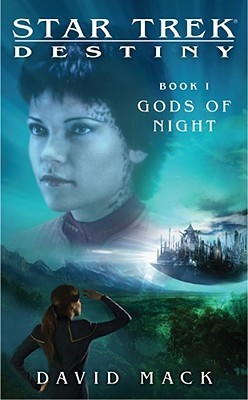Gods of Night (Star Trek: Destiny #1)
David Mack
Your rating:
Gods of Night (Star Trek: Destiny #1)
David Mack
Half a decade after the Dominion War and more than a year after the rise and fall of Praetor Shinzon, the galaxy's greatest scourge returns to wreak havoc upon the Federation -- and this time its goal is nothing less than total annihilation. Elsewhere, deep in the Gamma Quadrant, an ancient mystery is solved. One of Earth's first generation of starships, lost for centuries, has been found dead and empty on a desolate planet. But its discovery so far from home has raised disturbing questions, and the answers harken back to a struggle for survival that once tested a captain and her crew to the limits of their humanity.From that terrifying flashpoint begins an apocalyptic odyssey that will reach across time and space to reveal the past, define the future, and show three captains -- Jean-Luc Picard of the U.S.S. Enterprise, TM William Riker of the U.S.S. Titan, and Ezri Dax of the U.S.S Aventine -- that some destinies are inescapable.
Publication Year: 2008
No posts yet
Kick off the convo with a theory, question, musing, or update
Your rating:
'Gods of Night' is the first Star Trek novel I've read since I was a boy. The first part of the highly esteemed "Destiny" trilogy, the novel doesn't work as a stand-alone piece of fiction. Rather, it's the first act of a three-act play, setting up the dilemmas and conflicts to come while offering precious little resolution. I found 'Gods of Night' to be a fast, breezy, unsatisfying read.
The adjectives "fast" and "breezy" speak for themselves. "Unsatisfying," however, deserves a little explanation. This book didn't quite speak to me for three reasons: it assumed a familiarity with and affection for its characters that I didn't share, it allowed itself to be overcome by technobabble, and it didn't tell a complete story.
Regarding its assumption of familiarity, 'Gods of Night' expects the reader to be familiar with the characters and history of "Star Trek: The Next Generation," "Star Trek: Voyager," and "Star Trek: Deep Space Nine." I have passing familiarity with the first two, and I have watched the latter in its entirety. Note: I did not particularly enjoy "Deep Space Nine," but I made it "dishes and laundry" entertainment for a few years on the grounds that it's been hailed as the best of the new Trek series and I wanted to give it a fair hearing. When the book, in consequence, expected me to delight in the appearance of a fan favorite or referred to a popular episode in one of the shows' pasts, I merely shrugged.
Regarding its indulgence in technobabble, I found the long explications of imaginary science tedious. The author should have taken a page from "Doctor Who," told me a character merely 'reversed the polarity' of whatever s/he was working on, and gotten on with things.
Regarding its lack of completeness, I expect even the novels in a trilogy to tell standalone, complete stores while they link to the next entries. There was precious little of that here, making 'Gods of Night' little more than a tease for the two novels to come.
This book may delight fans of NuTrek and, as I said, many readers do consider it one of the best Trek stories out there. While 'Gods of Night' didn't work for me, you may love it. Many do.
